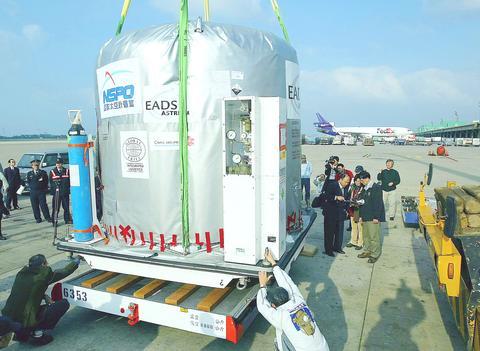Taiwan's second satellite, ROCSAT-2, which left the National Space Program Office (NSPO) in Hsinchu yesterday, is expected to be launch-ed on schedule in six weeks from California.
A trailer with cushion facilities took the 750kg satellite, packaged in a 2,100kg container displaying Taiwan's flag, to CKS International Airport in Taoyuan.

PHOTO: TONY YAO, TAIPEI TIMES
NSPO spokesmen said yesterday that a China Airlines Boeing 747 would carry the satellite and related equipment, weighing 14,295kg, directly to Los Angeles today. After the flight of just more than 10 hours, it will take another six hours to move the satellite by truck to Vandenberg Air Force Base.
"All the way to the base, vibration has to be limited to a certain level," Chern Jeng-shing (
A team of NSPO scientists and engineers arrived at the base yesterday to prepare for the launch on Jan. 17.
Since last Thursday, when the satellite was wrapped, nitrogen has been injected into the container to ensure stable conditions for the long journey.
According to Bobby Yu (余萃眾), general manager of China Airlines' cargo sales and services department, the airline's midway station in Anchorage, Alaska, would be bypassed to minimize the risks.
Richard Shen (沈成), general manager of Global Fritz Logistics Services, said special customs arrangements were made to facilitate the transportation.
When it arrives at Vandenberg Air Force Base, the satellite will be thoroughly tested for three days. The satellite will be coupled with a Taurus rocket, a four-stage, ground-launched vehicle, at a launch site operated by Orbital Sciences Corp, and should be ready at least 13 days prior to the launch.
Taiwan chose to launch the ROCSAT-2 from the US instead of India, which offered a half-price deal.
The launch services in the US cost about NT$ 1.3 billion, according to the NSPO.
Lee Lou-chuang (
"ROCSAT-2 satellite will be the first to observe rare phenomena like lighting-induced red sprites, upwardly discharging blue jets and gigantic jets," Lee said.
Being different from its predecessor, ROCSAT-1, which was launched in January 1999 and had a strictly scientific purpose, ROCSAT-2 will also have more down-to-earth applications involving remote-sensing technologies.
NSPO officials stressed yesterday that the ROCSAT-2 project, costing NT$4.7 billion in total, would further enhance Taiwan's abilities to predict natural disas-ters and map state-owned land. It will be able to take clear pictures of objects on the ground as small as 2m across.
The satellite is designed to orbit the earth 14 times a day, including two passes over Taiwan, 891km above the earth's surface.
Representatives of the Astrium Company of France, the NSPO's main contractor on the ROCSAT-2 project, said yesterday that everything had gone according to plan since the cooperation began in November 1999.

An essay competition jointly organized by a local writing society and a publisher affiliated with the Chinese Communist Party (CCP) might have contravened the Act Governing Relations Between the People of the Taiwan Area and the Mainland Area (臺灣地區與大陸地區人民關係條例), the Mainland Affairs Council (MAC) said on Thursday. “In this case, the partner organization is clearly an agency under the CCP’s Fujian Provincial Committee,” MAC Deputy Minister and spokesperson Liang Wen-chieh (梁文傑) said at a news briefing in Taipei. “It also involves bringing Taiwanese students to China with all-expenses-paid arrangements to attend award ceremonies and camps,” Liang said. Those two “characteristics” are typically sufficient

A magnitude 5.9 earthquake that struck about 33km off the coast of Hualien City was the "main shock" in a series of quakes in the area, with aftershocks expected over the next three days, the Central Weather Administration (CWA) said yesterday. Prior to the magnitude 5.9 quake shaking most of Taiwan at 6:53pm yesterday, six other earthquakes stronger than a magnitude of 4, starting with a magnitude 5.5 quake at 6:09pm, occurred in the area. CWA Seismological Center Director Wu Chien-fu (吳健富) confirmed that the quakes were all part of the same series and that the magnitude 5.5 temblor was

The brilliant blue waters, thick foliage and bucolic atmosphere on this seemingly idyllic archipelago deep in the Pacific Ocean belie the key role it now plays in a titanic geopolitical struggle. Palau is again on the front line as China, and the US and its allies prepare their forces in an intensifying contest for control over the Asia-Pacific region. The democratic nation of just 17,000 people hosts US-controlled airstrips and soon-to-be-completed radar installations that the US military describes as “critical” to monitoring vast swathes of water and airspace. It is also a key piece of the second island chain, a string of

The Central Weather Administration has issued a heat alert for southeastern Taiwan, warning of temperatures as high as 36°C today, while alerting some coastal areas of strong winds later in the day. Kaohsiung’s Neimen District (內門) and Pingtung County’s Neipu Township (內埔) are under an orange heat alert, which warns of temperatures as high as 36°C for three consecutive days, the CWA said, citing southwest winds. The heat would also extend to Tainan’s Nansi (楠西) and Yujing (玉井) districts, as well as Pingtung’s Gaoshu (高樹), Yanpu (鹽埔) and Majia (瑪家) townships, it said, forecasting highs of up to 36°C in those areas